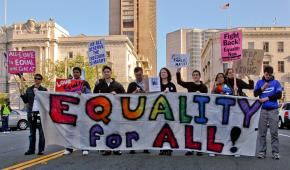To Riki, with respect
When people remain closeted, they have no voice. That's why we must provide a welcoming environment for our intersex brothers and sisters, writes .
I HAVE been on a whirlwind public speaking tour ever since my book Sexuality and Socialism came out in June. Having written a left-wing historical, political and theoretical analysis that grapples with the entire spectrum of sexual and gender variations, I've become accustomed to seeing audiences of gender-benders of every self-description.
It has been my great pleasure to meet and befriend many transgender people who feel that I respected their stories and their history--in a field of writing that largely tends to sideline trans issues.
But one gig I did in Portland, Maine, in September sticks in my mind as the first time in my presence that an intersex person stood up in public, bravely outed himself, and told a gathering of supportive listeners what it was like to go through life as a person who has both male and female parts.
Sexuality and Socialism discusses intersexuality as part of the spectrum of human sexual variation that must be accepted and embraced as the thoroughly normal physical reality that it is. An estimated one in every 2,000 infants in this country is born intersex, which according to the Intersex Society of North America (ISNA) is loosely defined as "a general term used for a variety of conditions in which a person is born with a reproductive or sexual anatomy that doesn't seem to fit the typical definitions of female or male."
Five times a day in American hospitals, doctors surgically alter a newborn infant's genitalia for cosmetic purposes, often amounting to mutilation that prevents the grown child from ever experiencing an orgasm. Ever since the 1950s, doctors have considered it a "medical emergency" to assign a fixed sex to a baby born with elements of both male and female genitalia. It is a cruel practice that amounts to medically sanctioned child abuse.
AT THE Portland meeting I could see my references to intersex people in the talk drew approving looks from a couple of folks in the crowd. After speaking, an older gentleman stood up and, in a loud, clear voice, told a story that riveted every person in that room.
He said his name was Richard, and he was born 67 years ago on a farm in rural Maine and worked much of his life in construction. He had the appearance of a man who'd worked hard with his hands and body and, in his older years, didn't have much money for clothes, dental care or personal frills.
Richard went on to describe how he'd discovered at the age of 24 that he was beginning to menstruate--after biologically fathering two children and serving in the armed forces. His breasts grew larger as he entered late female puberty.
Richard lived with the silent embarrassment and shame that many intersex people experience: Where could he toss a bloody pad on a construction site? How could hide his breasts from his co-workers? How could he get medical attention from a gynecologist? Would his family desert him if they knew the truth about his anatomical variations?
These and a million other daily insults and inconveniences kept him mum about his intersexuality until 10 years ago, when he turned 57 and couldn't remain quiet any longer.
After the meeting, Richard showed me the government papers he must carry with him to gain access to proper medical care. They were stamped "hermaphrodite" in large, typed letters--some bureaucrat's decision on high has retained that nasty, anachronistic slur in formal documentation.
When he asked me to sign a copy of my book for him, I asked him to spell his name just in case. He placed his hand on my arm and looked at me intently. "Please call me Riki now that you know who I really am," he said.
It strikes me that in the same way that the gay and lesbian struggle of the late 1960s and '70s opened the door for bisexuals and transgender people to come out and make their demands on the movement and society, it is now necessary for our burgeoning LGBT movement to give expression to the harm and shame that has been done to intersex people.
The case of South African runner Caster Semenya makes a blunt illustration of what will happen without civil rights for and social acceptance of intersex people. Caster, the 18-year-old phenom who broke the women's 800-meter record in Berlin this past summer, should be celebrating the victory of her young life, but instead is on suicide watch because she was secretly gender-tested and found to have internal testes and no ovaries.
I'm not sure what circle of hell Dante would have reserved for someone who so callously toys with the life of a young woman, but I can think of a few choice torments.
I truly admire people like Riki who can stand before an audience and speak an intimate and uncomfortable truth. For Riki and Caster's sake, activists should work to provide a safe and welcoming environment for our intersex brothers and sisters to come out and join us. As the LGBT struggle illustrates, so long as a people remain closeted, they have no voice, no respect and no solidarity.
Demand an end to state-sanctioned intolerance and imposition of rigid sex norms on healthy intersex newborns. Take a few minutes to peruse ISNA's Web site, and consider reading Jeffrey Eugenides' novel Middlesex over Christmas break for a start.



